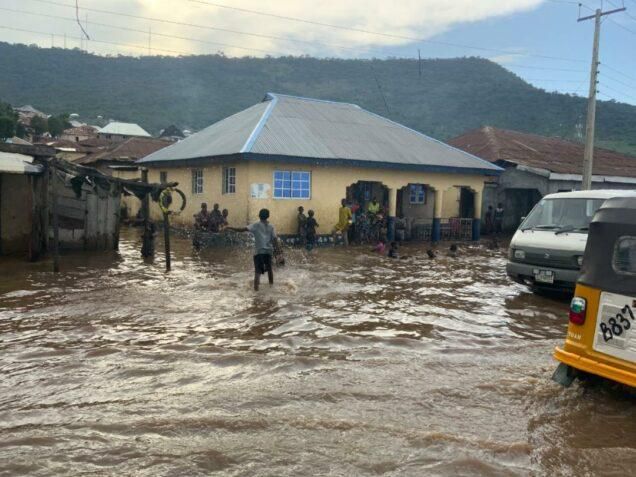Why a dam in Cameroon causes devastating floods in Nigeria every year [Pulse Explainer]
)
Due to the release of water from the Lagdo Dam in Cameroon, many Nigerian communities along the courses of River Niger and River Benue have been affected by floods.
The flooding which has claimed many lives and properties in Kogi state has also ravaged communities in Benue, Adamawa, Taraba, Anambra, and Nasarawa state.
In September, the National Emergency Management Agency and the Nigeria Hydrological Services Agency (NHISA) informed Nigerians that “the Lagdo Dam operators in the Republic of Cameroon, had commenced the release of excess water from the reservoir on September 13, 2022.”
The agencies said they were “aware that the released water cascades down into Nigeria, through River Benue and its tributaries, thereby overwhelming communities that have already been impacted by heavy rainfall”.
But the flooding affecting Kogi state particularly did not start today. The problem can be traced back to the 80s when the Nigerian government failed to honour an agreement it had with the Cameroonian authorities.
The Lagdo Dam in Cameroon
The construction of the Lagdo Dam located in Northern Cameroon started in 1977 and was completed in 1982.
At inception, Cameroon and Nigeria had an agreement to build two dams such that when water is released from the Cameroonian dam, the Nigerian dam would contain it and prevent it from causing floods.
So, to cushion the effect of possible flooding from the Lagdo dam in Cameroon, the Nigerian government agreed to build a shock-absorber dam tagged Dasin Hausa Dam in Adamawa State.
The Dasin Hausa dam in Nigeria
The Dasin Hausa dam was supposed to be two and a half the size of the Lagdo dam, which was built to supply electricity to the northern part of Cameroon and allow the irrigation of 15,000 hectares of crops downstream.
Like the Lagdo dam, the dam project sited at the Dasin Village of Fufore Local Government Area of Adamawa State was supposed to generate 300 megawatts of electricity and irrigate about 150,000 hectares of land in Adamawa, Taraba, and Benue states.
But sadly, since 1982, the Nigerian government has yet to complete the building of the Dasin Hausa dam.
As a result, anytime the Cameroonian government releases excess water from the Lagdo dam, communities in Kogi, Benue, and northeastern states get flooded.
According to the spokesperson of the National Emergency Management Agency (NEMA), Manzo Ezekiel, the 2022 flooding is the highest Nigeria has ever had since 2012.
The damages so far in 2022
The flood in Kogi has displaced thousands of Nigerians resident in the Ibaji Local Government Area of the state. The area has completely been submerged for days.
About six persons have reportedly died including a toddler and over 600 hectares of rice farmland among several buildings have been destroyed.

Since the opening of the Lagdo dam in September, 3,274 people in Benue state have reportedly been affected while about 1,213 houses are reported to have been destroyed.
In Jigawa, a total of 92 people have died from flooding, while 651,053 persons in six local government areas have been displaced by floods according to Nigerian Tribune.
The MoU that solves nothing
Meanwhile, years after its failure to build a dam to address the perennial flooding issue in states and communities along River Benue, the Federal Government of Nigeria has made a futile move to forestall the recurrence of the 2012 devastating floods.
In 2013, Nigeria sent a high-powered delegation to Yaounde, Cameroon’s capital to deliberate with the country’s authorities and to demand a commitment from them on how to address the periodic flooding in Nigeria caused by their Lagdo dam.
At the meeting, Nigeria and Cameroon signed a memorandum of understanding, which entails information sharing between the two countries about rainfall and how to manage the release of excess water without leading to flooding disasters.
It was also agreed that before Cameroon opens its dam, it must issue an early warning to enable Nigeria put proactive measures in place to prevent the destruction of lives and properties.
It is in compliance with the MoU that the Central African country usually deems it necessary to inform Nigerian authorities about its intention to release excess water from the Lagdo dam.
This arrangement, however, has failed to sufficiently address the flooding issue in Nigeria.
In November 2019, the Director-General, (NIHSA), Engr Clement Nze said the Lagdo dam authorities did not inform Nigeria before they opened the dam which released water for three weeks.
So, rather than completing the construction of the Dasin Hausa dam, which is said to be 90 percent completed -to prevent flooding- the Nigerian Government prefers to annually put Nigerians in Kogi, Edo, Delta, Bayelsa, Benue, and some states in the northeast on red alert before the water released in Cameroon finds its way to their communities.
)
![Aisha blows hot on Security forces; Y7ou won't believe what she said [VIDEO]](https://image.api.sportal365.com/process/smp-images-production/pulse.ng/17082024/1f976edf-1ee2-4644-8ba1-7b52359e1a8f?operations=autocrop(640:427))
)
)
)
![Lagos state Governor, Babajide Sanwo-Olu visited the Infectious Disease Hospital in Yaba where the Coronavirus index patient is being managed. [Twitter/@jidesanwoolu]](https://image.api.sportal365.com/process/smp-images-production/pulse.ng/16082024/377b73a6-190e-4c77-b687-ca4cb1ee7489?operations=autocrop(236:157))
)
)
)
)
)
)
)
)
)
)
)